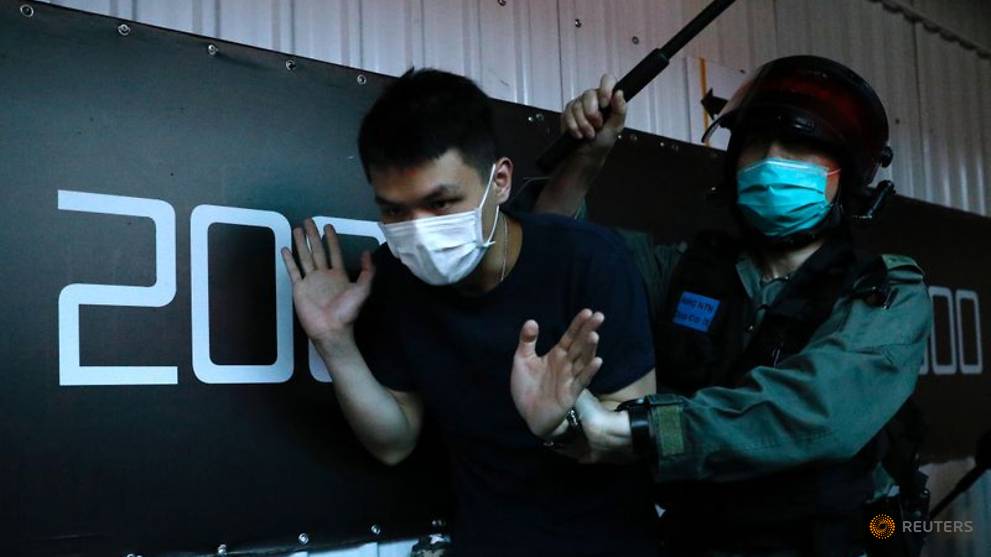
Hong Kong security, police chiefs warn of growing 'terrorism' as China security laws loom
HONG KONG: Hong Kong's security and police chiefs said "terrorism" was growing in the city, as government departments rallied on Monday behind Beijing's plans to introduce national security laws after thousands took to the streets to protest against the move.
The security legislation, which could see Chinese intelligence agencies set up bases in Hong Kong and aims to tackle secession, subversion and terrorist activities, has sent shockwaves through the business and diplomatic communities.
READ: Hong Kong - nearly a year of unrest
"Terrorism is growing in the city and activities which harm national security, such as 'Hong Kong independence', become more rampant," Secretary for Security John Lee said in a statement.
"In just a few months, Hong Kong has changed from one of the safest cities in the world to a city shrouded in the shadow of violence," he said, adding national security laws were needed to safeguard the city's prosperity and stability.
Police said they arrested more than 180 people on Sunday, when authorities fired tear gas and water cannon to disperse anti-government protesters as unrest returned to the Chinese-ruled city after months of relative calm.
Police Commissioner Chris Tang said there have been 14 cases involving explosives "commonly used in terrorist attacks overseas" and five seizures of firearms and ammunition since protests began in June last year.
The draft legislation "will help combat the force of 'Hong Kong independence' and restore social order. Police fully support it," Tang said.
Agencies issuing statements in support of the legislation included the Commissioner of Correctional Services, Hong Kong Customs, the Fire Department and the Government Flying Service.
In a return of the unrest that roiled Hong Kong last year, crowds thronged the streets of the city on Sunday in defiance of curbs imposed to contain the coronavirus, with chants of "Hong Kong independence, the only way out", echoing through the streets.
READ: Thousands protest in Hong Kong over China security law proposal
Calls for independence are anathema to Beijing, which considers Hong Kong an inalienable part of the country. The proposed new national security framework stresses Beijing’s intent "to prevent, stop and punish" such acts.
China's foreign ministry office in Hong Kong said on Monday some actions during last year's protests were "terrorist in nature", and that "troublemakers" colluded with foreign forces, posing "imminent danger" to national security.
Xie Feng, commissioner of China's Ministry of Foreign Affairs in Hong Kong, said the proposed law tackled secession, subversion, foreign interference and terrorism and would only affect a small number of residents, while for the rest "there was absolutely no need to panic".
"The legislation will alleviate the grave concerns among local and foreign business communities about the violent and terrorist forces," Xie said.
Activists fear it would limit rights and freedoms guaranteed under a "one country, two systems" agreement made with Britain on Hong Kong's 1997 return to Chinese rule.
But Xie said the legislation would, in fact, strengthen it and rights would be preserved.
"Do not be intimidated or misled, exploited by those with ulterior motives and in particular, do not be a rumour monger yourself, or join the anti-China forces in stigmatising or demonising the legislation," he said, addressing "law-abiding citizens and foreign internationals who love Hong Kong".

Protests are expected to resume on Wednesday, when the city's legislature is expected to give a second reading of a Bill that would criminalise abuse of China's national anthem.
"MISUNDERSTANDING"
Financial Secretary Paul Chan wrote on his blog on Sunday the national security law "itself" does not affect investor confidence, only the "misunderstanding" of it does.
“The central government has already said the law is targeted at the minority of people who are suspected of threatening national security and will not affect the rights of the general public.”
The United States, Australia, Britain, Canada and others have expressed concerns about the legislation, widely seen as a potential turning point for China's freest city and one of the world's leading financial hubs.
Taiwan, which has become a refuge for a small but growing number of protesters fleeing Hong Kong, will provide the people of Hong Kong with "necessary assistance", President Tsai Ing-wen said.
Nearly 200 political figures from around the world decried the legislation. Bankers and headhunters said the legislation could lead to money and talent leaving the city.
Hong Kong's bourse added a 1 per cent fall to the 5.6 per cent plunge on Friday when the new security plan was unveiled by Beijing and the Hong Kong dollar hovered around its lowest since March.
In a statement late on Sunday, a Hong Kong government spokesperson said the vast majority of residents and overseas investors "have nothing to fear" from the new security legislation and hit back at criticism from abroad.
"Sadly, and perhaps tellingly, those who claim to be acting in Hong Kong's best interests turn a blind eye to the explosives, petrol bombs, firearms, weapons, attacks on bystanders, wanton vandalism, online trolling and disinformation campaigns used by radical protesters and their hidden handlers to stoke fear and chaos and destabilise society," it said.
MORE: Our coverage of the Hong Kong protests
Follow us on Telegram for the latest on Hong Kong: https://cna.asia/telegram